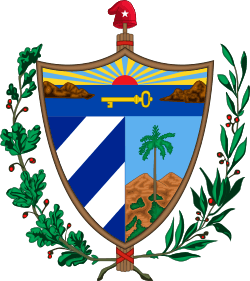Council of Ministers (Cuba)
 |
|---|
| This article is part of a series on the politics and government of Cuba |
|
|
Executive |
|
Judiciary
|
|
The Council of Ministers (Spanish: Consejo de ministros), also referred to as simply the Cabinet of Cuba, is the highest ranking executive and administrative body of the Republic of Cuba, and constitutes the nation's government. It consists of the President, the First Vice President and the seven Vice Presidents of the Council of State, the Secretary of the Executive Committee, the heads of the national ministries, and other members as established by law.
The Executive Committee is a smaller body, consisting of the President and Vice Presidents of the Council of State, the Secretary and those ministers chosen by the President. The Council of Ministers is responsible for the implementation of policy agreements authorized by the National Assembly of People’s Power. These are designated to individual ministries. The council also proposes general plans for economic and social development, which are in turn authorized by the National Assembly twice yearly.
The Council of Ministers also directs Cuba's foreign policy and its relations with other governments; approves international treaties before passing them over for ratification of the Council of State; directs and oversees foreign trade and the State budget. The Council of Ministers enforces laws authorized by the National Assembly, which are passed by the Council of State.
Current members
The body, which was most recently approved by the National Assembly in a vote of confidence on July 21, 2018,[1] currently consists of:[2]
| Position | Incumbent |
|---|---|
| President | Miguel Díaz-Canel |
| First Vice President of Council of Ministers | Salvador Valdés Mesa |
| Vice Presidents of Council of Ministers |
Ramiro Valdés Menéndez, Antonio Enrique Lussón Batlle, Adel Onofre Yzquierdo Rodríguez, Roberto Morales Ojeda, and Inés María Chapman |
| Vice Presidents of Council of Ministers and Executive Committee | Ricardo Cabrisas Ruíz and Ulises Rosales del Toro |
| Minister of Economy and Planning | Alejandro Gil Fernández |
| Minister of the Interior | Julio César Gandarilla Bermejo |
| Minister of Foreign Affairs (list) | Bruno Eduardo Rodríguez Parrilla |
| Minister of Justice | Oscar Manuel Silveira Martínez |
| Minister of the Revolutionary Armed Forces | Leopoldo Cintra Frias |
| Minister of Public Health | José Ángel Portal Miranda |
| Minister of Labor and Social Security | Margarita Marlene González Fernández |
| Minister of Agriculture | Gustavo Rodriguez Rollero |
| Minister of Education | Ena Elsa Velazquez Cobiella |
| Minister of Energy and Mines | Raúl García Barreiro |
| Minister of Culture | Alpidio Alonso Grau |
| Minister of Higher Education | Rodolfo Alarcon Ortiz |
| Ministerial President of the Central Bank of Cuba | Ernesto Medina Villaveirán |
| Minister of Science, Technology and Environment | Elba Rosa Pérez Montoya |
| Minister of Informatics and Communications | Jorge Luis Perdomo Di-Lella |
| Minister of Domestic Trade | Betsy Díaz Velázquez |
| Minister of Foreign Trade and Investment | Rodrigo Malmierca Diaz |
| Minister of Finance and Prices | Lina Olinda Pedraza Rodriguez |
| Minister of Construction | Rene Mesa Villafana |
| Minister of Industry | Salvador Pardo Cruz |
| Minister of Food Industry | Iris Quiñones Rojas |
| Minister of Tourism | Manuel Marrero Cruz |
| Minister of Transportation | Adel Onofre Yzquierdo Rodríguez |
| President of the Cuban Radio and Television Institute | Danylo Sirio López |
| President of the National Institute of Sports, P.E. and Rec | Julio Christian Jiménez Molina |
| President of the National Hydraulic Resources Institute | Antonio Rodríguez Rodríguez |
See also
References
- ↑ https://www.heraldmailmedia.com/news/nation/cuba-seats-new-ministers-but-old-guard-influence-remains/article_e6bce838-f2d9-557e-a917-b85adc5a7ea7.html
- ↑ "Consejo de Ministros". Government of Cuba. Retrieved 2013-09-17.
External links
- (Spanish) http://www.cubagob.cu/ - tag "Miembros" (members)
- (Spanish) http://www.parlamentocubano.cu/index.php?option=com_content&view=article&id=49&Itemid=96